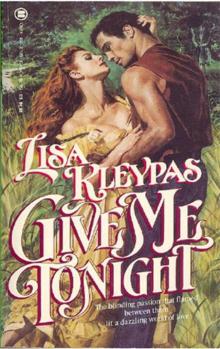- Home
- Lisa Kleypas
Cold-Hearted Rake Page 8
Cold-Hearted Rake Read online
Page 8
“Fiddlesticks.” Pandora tossed the piece aside. “This is frustraging.”
At Devon’s puzzled expression, Helen explained, “Pandora likes to invent words.”
“I don’t like to,” Pandora said irritably. “It’s only that sometimes an ordinary word doesn’t fit how I feel.”
Rising from the piano bench, Helen approached Devon. “Thank you for finding Kathleen, my lord,” she said, her gaze smiling. “She is resting upstairs. The maids are preparing a hot bath for her, and afterward Cook will send up a tray.”
“She is well?” he asked, wondering exactly what Kathleen had told Helen.
Helen nodded. “I think so. Although she is a bit weary.”
Of course she was. Come to think of it, so was he.
Devon turned his attention to his brother. “West, I want to speak to you. Come with me to the library, will you?”
West drained the rest of his tea, stood, and bowed to the Ravenel sisters. “Thank you for a delightful afternoon, my dears.” He paused before departing. “Pandora, sweetheart, you’re attempting to cram Portsmouth into Wales, which I assure you will please neither party.”
“I told you,” Cassandra said to Pandora, and the twins began to squabble while Devon and West left the room.
Chapter 5
“L
ively as kittens,” West said as he and Devon walked to the library. “They’re quite wasted out here in the country. I’ll confess, I never knew that the company of innocent girls could be so amusing.”
“What if they were to take part in the London season?” Devon asked. It was one of approximately a thousand questions buzzing in his mind. “How would you rate their prospects?”
West looked bemused. “At catching husbands? Nonexistent.”
“Even Lady Helen?”
“Lady Helen is an angel. Lovely, quiet, accomplished… she should have her pick of suitors. But the men who would be appropriate for her will never come up to scratch. Nowadays no one can afford a girl who lacks a dowry.”
“There are men who could afford her,” Devon said absently.
“Who?”
“Some of the fellows we’re acquainted with… Severin, or Winterborne…”
“If they’re friends of ours, I wouldn’t pair Lady Helen with one of them. She was bred to marry a cultivated man of leisure, not a barbarian.”
“I would hardly call a department store owner a barbarian.”
“Rhys Winterborne is vulgar, ruthless, willing to compromise any principle for personal gain… qualities I admire, of course… but he would never do for Lady Helen. They would make each other exceedingly unhappy.”
“Of course they would. It’s marriage.” Devon sat in a musty chair positioned behind a writing desk in one of the deep-set window niches. So far the library was his favorite room in the house, paneled in oak, with walls of floor-to-ceiling bookshelves that contained at least three thousand volumes. One bookcase had been fitted with narrow stacked drawers for storing maps and documents. Agreeable hints of tobacco, ink¸ and book dust spiced the air, overlaying the sweetness of vellum and parchment.
Idly Devon reached for a wooden cigar holder on the nearby desk and examined it. The piece was carved in the shape of a beehive, with tiny brass bees scattered on its surface. “What Winterborne needs most is something he can’t purchase.”
“Whatever Winterborne can’t purchase isn’t worth having.”
“What about an aristocrat’s daughter?”
West wandered past the bookshelves, perusing titles. He pulled a volume from a shelf and examined it dispassionately. “Why the devil are we talking about arranging a match for Lady Helen? Her future is none of your concern. After we sell the estate, you’ll likely never see her again.”
Devon traced the pattern of inset bees as he replied, “I’m not going to sell the estate.”
West fumbled with the book, nearly dropping it. “Have you gone mad? Why?”
He didn’t want to have to explain his reasons, when he was still trying to sort through them. “I have no desire to be a landless earl.”
“When has your pride ever mattered?”
“It does now that I’m a peer.”
West gave him a sharply assessing glance. “Eversby Priory is nothing you ever expected to inherit, nor desired, nor prepared for in any way whatsoever. It’s a millstone tied around your neck. I didn’t fully grasp that until the meeting with Totthill and Fogg this morning. You’d be a fool if you do anything other than sell it and keep the title.”
“A title is nothing without an estate.”
“You can’t afford the estate.”
“Then I’ll have to find a way.”
“How? You have no bloody idea how to manage complex finances. As for farming, you’ve never planted so much as a single turnip seed. Whatever you’re qualified for, which isn’t much, it’s certainly not running a place like this.”
Oddly, the more that his brother echoed the doubts that were already in his mind, the more stubborn Devon became. “If Theo was qualified, I’ll be damned if I can’t learn to do it.”
West shook his head incredulously. “Is that where this nonsense is coming from? You’re trying to compete with our dead cousin?”
“Don’t be an idiot,” Devon snapped. “Isn’t it obvious there’s far more at stake than that? Look around you, for God’s sake. This estate supports hundreds of people. Without it, many of them won’t survive. Tell me you’d be willing to stand face-to-face with one of the tenants and tell him that he has to move his family to Manchester so they can all work in a filthy factory.”
“How can the factory be any worse than living on a muddy scrap of farmland?”
“Considering urban diseases, crime, slum alleys, and abject poverty,” Devon said acidly, “I’d say it’s considerably worse. And if my tenants and servants all leave, what of the consequences to the village of Eversby itself? What will become of the merchants and businesses once the estate is gone? I have to make a go of this, West.”
His brother stared at him as if he were a stranger. “Your tenants and servants.”
Devon scowled. “Yes. Who else’s are they?”
West’s lips curled in a derisive sneer. “Tell me this, oh lordly one… what do you expect will happen when you fail?”
“I can’t think about failure. If I do, I’ll be doomed from the start.”
“You’re already doomed. You’ll preen and posture as lord of the manor while the roof caves in and the tenants starve, and I’m damned if I’ll have any part of your narcissistic folly.”
“I wouldn’t ask you to,” Devon retorted, heading for the door. “Since you’re usually as drunk as a boiled owl, you’re of no use to me.”
“Who the hell do you think you are?” West called after him.
Pausing at the threshold, Devon gave him a cold glance. “I’m the Earl of Trenear,” he said, and left the room.
Chapter 6
F
or the first time since Theo’s accident, Kathleen had slept without nightmares. After emerging from a deep rest, she sat up in bed as her lady’s maid, Clara, brought her breakfast tray.
“Good morning, milady.” Clara placed the tray on Kathleen’s lap while a housemaid opened the curtains to admit a spill of weak gray light from the cloud-hazed sky. “Lord Trenear gave me a note to set by your plate.”
Frowning curiously, Kathleen unfolded the small parchment rectangle. Devon’s penmanship was angular and decisive, the words written in black ink.
Madam,
As I will soon depart for London, I would like to discuss a matter of some consequence. Please come to the library at your earliest convenience.
Trenear
All her nerves jumped at the notion of facing Devon. She knew why he wanted to speak to her… he was going to ask her to leave the estate as soon as possible. He would not want to be burdened by the presence of Theo’s widow, or his sisters, and certainly no one would expect it of him.
Today she would send out inquiries to find a house. With strict economizing, she, Helen, and the twins could live on the income from her jointure. Perhaps it was for the best to make a new beginning somewhere else. Very little good had come to her in the three months she had lived at Eversby Priory. And although Helen and the twins loved the only home they had ever known, they would benefit from a change. They had been secluded from the world for too long… They needed new people, new scenery, new experiences. Yes… the four of them, together, would manage.
But Kathleen was worried about what would become of the servants and tenants. It was a pity too that with Theo’s death, the Ravenel family and its proud legacy had essentially come to an end.
Filled with melancholy, she dressed with Clara’s assistance in multiple layers of petticoats, a corset, and a petite padded bustle. Next came a black crepe dress, fitted close to the body with pleated tiers that draped down the back and ended in a slight train. The dress was fastened down the front with jet buttons, the long sleeves fitted closely to her wrists and finished with detachable cuffs made of white linen. She considered and rejected the idea of a veil, deciding wryly that she and Devon were beyond such formalities.
While Clara arranged Kathleen’s hair in plaits that had been twisted and pinned tightly to the back of her head, she asked cautiously, “Milady, has his lordship said anything about what he plans to do with the staff? Many are worried about their positions.”
“So far he has said nothing to me of his plans,” Kathleen said, inwardly chafing at her own helplessness. “But your position with me is safe.”
“Thank you, milady.” Clara looked marginally relieved, but Kathleen understood her conflicting emotions. After being an upper servant at a grand estate, it would be a comedown to work at a cottage or a set of rented rooms.
“I’ll do what I can to influence Lord Trenear on behalf of the servants,” Kathleen told her, “but I’m afraid I have no sway over him.”
They exchanged bleak smiles, and Kathleen left the room.
As she approached the library, she felt her heartbeat quicken uncomfortably. Squaring her shoulders, she crossed the threshold.
Devon appeared to be browsing over a row of books, reaching up to straighten a trio of volumes that had fallen sideways.
“My lord,” Kathleen said quietly.
Devon turned, his gaze finding hers at once. He was stunningly handsome, dressed in a dark suit of clothes that had been tailored in the new looser-fitting fashion, the coat, waistcoat, and trousers all made of matching fabric. The informal cut of the suit did nothing to soften the hard lines of his body. For a moment Kathleen couldn’t help remembering the feel of his arms around her, his solid chest beneath her cheek. Heat swept over her face.
Devon bowed, his face inscrutable. He appeared relaxed at first glance, but a closer look revealed faint shadows beneath his eyes, and finespun tension beneath his calm veneer. “I hope you’re well this morning,” he said quietly.
Her blush deepened uncomfortably. “Yes, thank you.” She curtsied and wove her fingers together in a stiff knot. “You wished to discuss something before you depart?”
“Yes, regarding the estate, I’ve come to some conclusions —”
“I do hope —” she began, and broke off. “Forgive me, I didn’t mean to —”
“Go on.”
Kathleen dropped her gaze to her clenched hands as she spoke. “My lord, if you decide to dismiss any of the servants… or indeed all of them… I hope you take into account that some have served the Ravenels for their entire lives. Perhaps you might consider giving small parting sums to the oldest ones who have little hope of securing other employment.”
“I’ll bear it in mind.”
She could feel him looking at her, his gaze as tangible as the heat of sunlight. The mahogany bracket clock on the mantel measured out the silence with delicate ticks.
His voice was soft. “You’re nervous with me.”
“After yesterday —” She broke off and swallowed hard, and nodded.
“No one but the two of us will ever know about that.”
Even if Kathleen chose to believe him, it didn’t set her at ease. The memory was an unwanted bond with him. He had seen her at her weakest, her lowest, and she would have preferred him to be mocking rather than treat her with gentleness.
She forced herself to meet his gaze as she admitted with vexed honesty, “It’s easier to think of you as an adversary.”
Devon smiled faintly. “That puts us in an awkward situation, then, as I’ve decided against selling the estate.”
Kathleen was too astonished to reply. She couldn’t believe it. Had she heard him correctly?
“Eversby Priory’s situation is so desperate,” Devon continued, “that few men could conceivably make it worse. Of course, I’m probably one of them.” He gestured to a pair of chairs positioned near the writing desk. “Will you sit with me?”
She nodded, her thoughts racing as she settled into the chair. Yesterday he had seemed so resolved – there had been no doubt that he would dispense with the estate and all its problems as expediently as possible.
After she had arranged her skirts and folded her hands in her lap, she sent him a wondering gaze. “May I ask what caused you to change your mind, my lord?”
Devon was slow to reply, his expression troubled. “I’ve tried to think of every reason why I should wash my hands of this place. But I keep returning to the conclusion that I owe it to every man, woman, and child on this estate to try and save the estate. Eversby Priory has been the work of generations. I can’t destroy it.”
“I think that’s a very admirable decision,” she said with a hesitant smile.
His mouth twisted. “My brother calls it vanity. He predicts failure, of course.”
“Then I’ll be the counterbalance,” she said impulsively, “and predict success.”
Devon gave her an alert glance, and he dazzled her with a quick grin. “Don’t put money on it,” he advised. The smile faded except for a lingering quirk at one corner of his mouth. “I kept waking during the night,” he said, “arguing with myself. But then it occurred to me to wonder what my father would have done, had he lived long enough to find himself in my position.”
“He would have saved the estate?”
“No, he wouldn’t have considered it for a second.” Devon laughed shortly. “It’s safe to say that doing the opposite of what my father would have done is always the right choice.”
Kathleen regarded him with sympathy. “Did he drink?” she dared to ask.
“He did everything. And if he liked it, he did it to excess. A Ravenel through and through.”
She nodded, thinking of Theo. “It has occurred to me,” she ventured, “that the family temperament isn’t well suited to stewardship.”
Amusement glinted in his eyes. “Speaking as a man who has the family temperament in full measure, I agree. I wish I could claim to have a mother from steady, pragmatic stock, to balance out the Ravenel wildness. Unfortunately she was worse.”
“Worse?” Kathleen asked, her eyes widening. “She had a temper?”
“No, but she was unstable. Flighty. It’s no exaggeration to say there were days at a time when she forgot she even had children.”
“My parents were very attentive and involved,” Kathleen volunteered after a moment. “As long as you were a horse.”
Devon smiled. He leaned forward and rested his forearms on his legs, dropping his head for a moment. The posture was far too casual to affect in the presence of a lady, but it revealed how very tired he was. And overwhelmed. For the first time, Kathleen felt a stirring of genuine sympathy for him. It wasn’t fair that a man should have to contend with so many dire problems all at once, without warning or preparation.
“There’s another matter I need to discuss,” he said eventually, sitting up again. “I can’t, in good conscience, turn Theo’s sisters out of the only home they’ve ever known.” One of his brows arched as
he saw her expression. “Yes, I have a conscience. It’s been abused and neglected for years, but even so, it occasionally manages to be a nuisance.”
“If you’re considering allowing the girls to remain here —”
“I am. But the scenario presents obvious difficulties. They’ll require a chaperone. Not to mention rigorous instruction, if they’re eventually to come out in society.”
“Society?” Kathleen echoed in bemusement. “All three?”
“Why not? They’re of an age, aren’t they?”
“Yes, but… the expense…”
“That’s for me to worry about.” He paused. “You would manage the most difficult part of the whole business by taking the twins in hand. Civilizing them to whatever extent you can manage.”

 Devil in Spring
Devil in Spring Sugar Daddy
Sugar Daddy Devil in Winter
Devil in Winter Dreaming of You
Dreaming of You Christmas Eve at Friday Harbor
Christmas Eve at Friday Harbor Love, Come to Me
Love, Come to Me Only With Your Love
Only With Your Love Suddenly You
Suddenly You Secrets of a Summer Night
Secrets of a Summer Night Cold-Hearted Rake
Cold-Hearted Rake Where's My Hero?
Where's My Hero? Gifts of Love
Gifts of Love Married by Morning
Married by Morning Then Came You
Then Came You Wish List
Wish List Where Dreams Begin
Where Dreams Begin A Historical Christmas Present
A Historical Christmas Present Somewhere I'll Find You
Somewhere I'll Find You Scandal in Spring
Scandal in Spring Someone to Watch Over Me
Someone to Watch Over Me Worth Any Price
Worth Any Price Prince of Dreams
Prince of Dreams It Happened One Autumn
It Happened One Autumn Love in the Afternoon
Love in the Afternoon Devil's Daughter
Devil's Daughter A Wallflower Christmas
A Wallflower Christmas Tempt Me at Twilight
Tempt Me at Twilight Brown-Eyed Girl
Brown-Eyed Girl Mine Till Midnight
Mine Till Midnight Again the Magic
Again the Magic Lady Sophia's Lover
Lady Sophia's Lover Because You're Mine
Because You're Mine Midnight Angel
Midnight Angel Smooth-Talking Stranger
Smooth-Talking Stranger Blue-Eyed Devil
Blue-Eyed Devil Hello Stranger
Hello Stranger Dream Lake
Dream Lake Devil's Daughter: The Ravenels Meet the Wallflowers
Devil's Daughter: The Ravenels Meet the Wallflowers A Christmas to Remember
A Christmas to Remember Smooth Talking Stranger
Smooth Talking Stranger Crystal Cove
Crystal Cove Marrying Winterborne
Marrying Winterborne Stranger in My Arms
Stranger in My Arms Devil in Disguise
Devil in Disguise Worth Any Price bsr-3
Worth Any Price bsr-3 Give Me Tonight
Give Me Tonight Rainshadow Road fh-2
Rainshadow Road fh-2 Seduce Me At Sunrise
Seduce Me At Sunrise I Will
I Will Someone to Watch Over Me bsr-1
Someone to Watch Over Me bsr-1 Lady Sophias Lover bsr-2
Lady Sophias Lover bsr-2 A Hathaway Wedding
A Hathaway Wedding A Hathaway Wedding (Hathaways Bk2.5)
A Hathaway Wedding (Hathaways Bk2.5) Worth Any Price - Bow Street 3
Worth Any Price - Bow Street 3 Christmas with Holly
Christmas with Holly